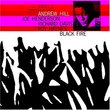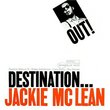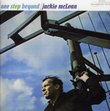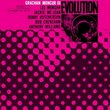| All Artists: Sam Rivers Title: Fuschia Swing Song Members Wishing: 2 Total Copies: 0 Label: Blue Note Records Original Release Date: 1/1/1964 Re-Release Date: 10/7/2003 Album Type: Extra tracks, Limited Edition, Original recording remastered Genres: Jazz, Pop Styles: Avant Garde & Free Jazz, Modern Postbebop, Bebop Number of Discs: 1 SwapaCD Credits: 1 UPC: 724359041322 |
Search - Sam Rivers :: Fuschia Swing Song
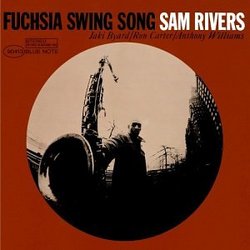 | Sam Rivers Fuschia Swing Song Genres: Jazz, Pop
|
Larger Image |
CD DetailsSimilar CDs
|
CD ReviewsHeaven on a Blue Note Pharoah S. Wail | Inner Space | 06/18/2004 (5 out of 5 stars) "Beyond just being one of my favorite Blue Note albums, this is one of my favorite albums, period.I can see where one of the previous reviewers is coming from with respect to Jaki Byard's playing. He indeed was a guy who had the entire history of jazz piano at his fingertips and could play it at any time. Like anything else, I guess that will work for some listeners and not work for some listeners. I love it. I think it works perfectly on this album, and I can't help but think that the other guys in the band loved it as well. Tony Williams' playing here, for instance, often hinges right on what Jaki is playing. There are a couple times on here where Jaki changes the entire rhythm and tone of the jam, and Tony is instantly on top of it. Taking it back right there with Jaki, as if they were sharing one soul in that moment. It's just fantastic and moving to hear, in my opinion. Sam's own playing and tone are as gorgeous as ever. Sometimes he is firey and intense, and other times he does that hypnotic, drifting, dreamy repetitive thing he does that I love so much. I can't help but thinking that Sam's playing here, and some of Eric Dolphy's more relaxed, spacial stuff are probably the two main players (at least of saxophones) who influenced and guided Evan Parker's later explorations and subsequent utter reinvention of the capabilities of the soprano saxophone.This is one of those bands that makes me regret that era of jazz, where bands so often came together and split apart after just a couple recording sessions. The three alternate takes are the source of my lament. The last 2 are so completely different (and great!) in mood and attack that I just know this band could have had a 100-song repertoire and played 200 nights a year and killed people everywhere they went, without ever repeating themselves.I just can't help wondering what other jewels would have been forged had this quartet been together for even just three years and two or three albums. This would have been one of the all-time legendary bands.I can't do anything but wholeheartedly recommend this release." The "In" and the "Out" Todd M. Stellhorn | baltimore, MD | 03/13/2008 (5 out of 5 stars) "In the mid-sixties a certain strand of relatively accesible avant-garde Blue Note albums appeared, helmed by the likes of Eric Dolphy, Jackie Mclean, Bobby Hutcherson, Tony Williams, Andrew Hill, and of course the great Sam Rivers. Many of those albums such as Dophy's Out to Lunch, Hill's Point of Departure, and Mclean's Let Freedom Ring (among others), are stone cold classics of a very interesting sub-genre. But even in a crowded field of classics Sam River's debut: "Fuchsia Swing Song" stands out. The genius of that whole purple-patch of avant-garde Blue Notes is that the freedom, and "out" playing they displayed where always structured in an obvious way that wouldn't alienate fans of the hard-bop Blue Note style. Much as Ornette Coleman was always deep in the blues, which gave his music a point of reference, and even gravity; Sam Rivers always had a method to his madness, a foundation of what came before as a base to explore the future. Rivers couldn't have picked a better pianist to lay that essential foundation. As has been noted before (and by this point might be cliche) Jaki Byard is steeped in jazz tradition. It pours out of his fingers in such an individualistic, wonderfully subjective way that in retreading the old, something new is born. It's no wonder that Charles Mingus (a man as weary of the piano as Rivers) was so taken with Byard. On this album esspecially it's instructive to compare the similar directions both Mingus and Rivers were going with the music (see Cornell 1964, which also prominently features Byard, for comparison). Along with Rivers and Byard "Fuchsia Swing Song" also features Ron Carter and River's protegee Tony Williams, both of Miles Davis's second great quintet fame. The names should speak for themselves: this was a rhythem section not to be beaten. On this album (as well as the notoriously out of print "New Conception") Sam is investigating traditional form and seeing where it can be taken in light of Coleman's inovations. To say that the experiment is a success is, to say the least, an understatement. For my money there was never a better marriage of the "in" and the "out" comitted to record. In fact this album can and should be used as a primer for jazz fans looking to understand the avant-garde. Despite what critics (like the the hilariously arrogant writers of "The Penguin Guide to Jazz") say, there is no attempt here to pander to the hard-bop market by filing the edges off River's tenor playing. Quite the opposite, one of the main characteristics of this album is it's authenticity, it's direct, honest, musical mission to create a synthesis between two seemingly opposite poles. There seems to be some debate between the converted as to which album, this or the equally wonderful "Contours, is the superior effort. I would give the same advice in this instance as I would with two other brilliant Blue Notes; Hank Mobley's "Soul Station" and "Roll Call". If you prefer the tenor in the company of a trumpet go with "Contours" (or in Mobley's example "Roll Call"), however if you like the freedom and uncluttered atmosphere that a quartet allows (and I'm of this school of thought) then you will not be disapointed by "Fuchsia Swing Song" (or for that matter "Soul Station"). In anycase, this is vintage Sam Rivers, playing exclusively tenor (the instrument he was always best at), and it's impossible to go wrong. This album is as highly recommended as possible.
Cheers." |

 Track Listings (10) - Disc #1
Track Listings (10) - Disc #1